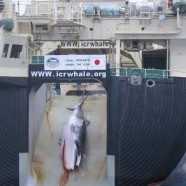Japanese “Scientific Whaling” by its Right Name is “Commercial Whaling”
Information note N°3
Whales at the International Court of Justice
The Hague, The Netherlands, 1st hearing of Australia, June 26th – June 28th
In his opening statement for Australia, Mr Campbell projected an image of a Japanese vessel with “Legal Research under the ICRW”* painted on the side and yet another whale lying dead on the slipway. For Australia, this is the image and language of a country trying to convince itself that they are contributing to science and thereby respecting the law. The international community and more specifically the international scientific community is not convinced.
The End of the Japanese Fairy Tale
Information note n°2
Whales at the International Court of Justice
The Hague, The Netherlands, 1st hearing of Australia, June 26th – June 28th
Impressions on the Australian point of view during the hearings from June 26th 27th and 28th 2013
During the first three days of the Australia v. Japan court case at the International Court of Justice, Australia has been presenting arguments stating them loud and clear to wake Japan up from over twenty years’ of sleep. Japan, indeed, had fallen into a deep legal sleep like a “Sleeping Beauty”, and the international community should not wait until a “beautiful white whale” comes along to wake them up. Such was the metaphor used by Mme Boisson De Chazournes when she presented the court with Japan’s interpretation on the wording of the text of the International Whaling Commission (IWC). She stated that contrary to Japan’s reading of the 1946 IWC, the Convention enforces whale conservation and does not provide for the reinforcement of commercial whaling. As to the breaching of international law, and the continuation of whaling by Japan, Australia’s arguments are threefold. Firstly, the use of whale catchers and factory ships, secondly, a clear breaching of the 1986 moratorium on commercial whaling and thirdly, a violation of the Southern Ocean Sanctuary specifically with regard to fin whale catches.
The End of the Japanese Fairy Tale
Information note N°2
Whales at the International Court of Justice
The Hague, The Netherlands, 1st hearing of Australia, June 26th – June 28th
Impressions on the Australian point of view during the hearings from June 26th 27th and 28th 2013
During the first three days of the Australia v. Japan court case at the International Court of Justice, Australia has been presenting arguments stating them loud and clear to wake Japan up from over twenty years’ of sleep. Japan, indeed, had fallen into a deep legal sleep like a “Sleeping Beauty”, and the international community should not wait until a “beautiful white whale” comes along to wake them up. Such was the metaphor used by Mme Boisson De Chazournes when she presented the court with Japan’s interpretation on the wording of the text of the International Whaling Commission (IWC). She stated that contrary to Japan’s reading of the 1946 IWC, the Convention enforces whale conservation and does not provide for the reinforcement of commercial whaling. As to the breaching of international law, and the continuation of whaling by Japan, Australia’s arguments are threefold. Firstly, the use of whale catchers and factory ships, secondly, a clear breaching of the 1986 moratorium on commercial whaling and thirdly, a violation of the Southern Ocean Sanctuary specifically with regard to fin whale catches.
Whales are still out of sorts
Robin des Bois remains very sceptical about the evolution of the compromise on research at the heart of the IWC. A number of delegations and NGOs have made it their priority and deplored that in the convention’s actual state Japan, Iceland and Norway remain out of its’ control. Robin des Bois prefers this situation to that of the International Whaling Commission being controlled by Japan, Iceland and Norway.
Robin des Bois hopes that France and other European Nations unite with Australia when they bring their claim to the International court of Justice in The Hague, aiming at banning scientific whaling carried out by Japan in the Austral Ocean. In this way the Japanese whaling fleets’ next campaign in the Antarctic will be increasingly contested.
Phew! The Compromise went Plonk!
Arriving confident and ready to fight, promoters of the so called “compromise” document are today taking a low profile. Two days of “private meetings between commissioners” safe from the eyes and ears of NGOs proved fruitless. Japan, Norway, Island and Korea were successively heard by groups of 5 countries during thirty odd sessions over two days. The process was compared by some delegates to “speed dating”.
Now some countries feel, that they should start anew, others believe that they should take into account the documents on the agenda as basis for future work. The European Union prefers the latter. Formalities on how to move the discussion forward during this “new period of reflection” will be taken before the end of the debates.










